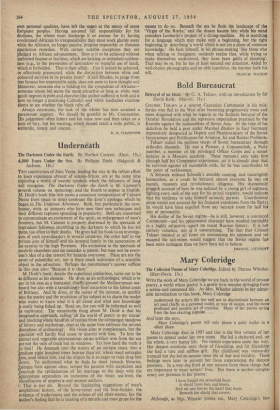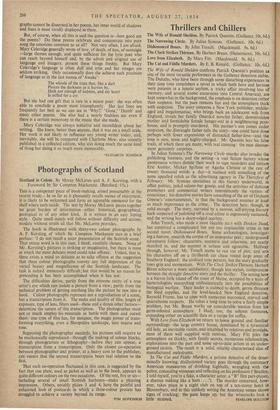Mary Coleridge
The Collected Poems of Mary Coleridge. Edited by Theresa Whistler. (Hart-Davis. 15s.) Wrrx the work of Mary Coleridge we are back in the world of private poetry, a world where poetry is a gentle lyric impulse springing from a serene and contented life. As Mrs. Whistler admits in her admir- able introduction to this book, Mary Coleridge
understood the artist's life too well not to discriminate between an art used chiefly as a personal outlet, or way of escape, and the more profound and positive act of creation. Many of her poems spring from the less exacting impulse ...
And later she says, • Mary Coleridge's poems will only please a quiet reader in a silent place. Mary Coleridge died in 1907 and this is the first volume of her poems to appear under her own name. She led a sheltered and, on the whole, a very happy life. No violent experience came her way. Her deepest emotions were those of friendship, and for friendship she had a rare and selfless gift. Her childhood was outwardly tranquil but she led an intense inner life of fear and timidity. These feelings were later to prevent her from experiencing the deepest passions. In a way she lived at one remove from those things that are important in most writers' lives. But there is neither compla- cency nor pretence in her poems: I have forged me sevenfold heats A shield from foes and lovers, And no one knows the heart that beats Beneath the shield that covers.
Although, as MIs. Whistler points out, Mary Coleridge's bio- graphy cannot be discerned in her poems, her inner world of shadows and fears is most vividly displayed in them.
But, of course, when all this is said the question is—how good are the poems? Do these poems celebrate and concentrate into pure song the emotions common to us all? Not very often, I am afraid. Mary Coleridge generally wrote of love, of death, of loss, of nostalgia —large themes enough, and quite sufficient for the lyric poet who can reach beyond himself and, by the adroit and original use of language and imagery, present these things freshly. But Mary Coleridge's language is often dull and trite and her images are seldom striking. Only occasionally does she achieve such precision
' of language as in the last stanza of ` Awake': The whistle of the train that, like a dart Pierces the darkness as it hurries by, Hath not enough of sadness, and my heart Is stifled for a cry.
But she had one gift that is 'rare in a minor poet: she was often able to conclude a poem most triumphantly. Her last lines are frequently her best as we can see in ' Why?,' 'Gone,"Dumb' and many other poems. She also had a nearly faultless ear even if there is a certain monotony in the music that she made.
Mary Coleridge was always tentative and inconfident about her writing. She knew, better than anyone, that it was on a small scale. Her work is not likely to influence any young writer today, and, inevitably, she will be compared with Charlotte Mew, also recently published in a collected edition, who was doing much the same kind of thing but doing it so much more memorably.
• ELIZABETH JENNINGS



































 Previous page
Previous page